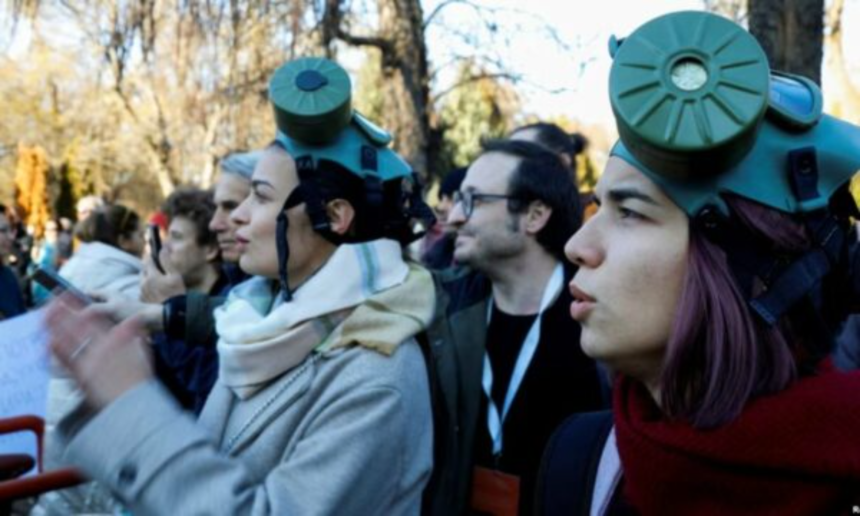“ALARM!! – We want clean air”, “The future is not visible because of the smog”, “Our air is poison, our government is deaf” – these were some of the slogans on banners held by the residents of Skopje, who on Saturday, for the second time this month, took to the streets in a protest march against air pollution.
As in the previous protest, the demonstrators began their march from the Ministry of Environment and Spatial Planning, continued towards the Parliament, and concluded in front of the City of Skopje buildings.
Two weeks have passed since the initial demands were submitted after the first protest, but so far, there has been no response from the authorities, protest leaders emphasized.
The organizers, the initiative “Green Human City,” along with the protesting citizens, presented four demands to fight air pollution in Skopje, including continuous public monitoring of industrial facilities to ensure transparency regarding those responsible for air pollution.
“The second demand relates to ecological heating of buildings, such as the ‘Kozle’ Children’s Clinic, which is still heated with oil. The third demand is to solve car-centricity in the city, prioritizing public transport and bicycles over cars, and the fourth demand is better waste management,” said Borjan Jovanovski from the civic initiative “Green Human City.”
The protesters, during the previous demonstration on December 10, emphasized that the reason for the protest was the numerous deaths linked to air pollution, which, according to them, account for 17.7% of total deaths in the country.
“One in every nine deaths among infants in North Macedonia is linked to polluted air,” the United Nations agency reported in September this year.
Skopje has consistently been among the most polluted cities in the world in recent months, according to the global company IQAir, which measures air quality. Meanwhile, the only measure implemented during the period of highest air pollution is free public transportation.
On December 23, authorities announced a new measure to combat pollution, which they claim will bring “a green future to the capital.” This involves a project to be implemented in three municipalities of Skopje: Aerodrom, Čair, and Gazi Baba, with 100 electric vehicles that will be available for government institutions, companies, and citizens via a mobile app, for a fee.
The project is set to begin next year after the necessary infrastructure is prepared, including parking spots and charging stations, which will use green energy. The investment for this project is expected to cost around 30 million euros by 2030.
Criticism of Proposed Measures
Meanwhile, citizen environmental organizations opposed this decision, stating that it was a step in the wrong direction. According to them, this initiative will bring more vehicles into the city, further congesting the already limited space.
On December 16, the civic organization, Initiative O2, in a written response to Radio Free Europe, announced a series of concrete measures addressed to the municipal councilors and the Mayor of Skopje, Danela Arsovska. These measures include: banning polluting fuels, installing filters for wood burning, traffic control, banning the use of mazut and other fuels, and installing cameras to monitor waste burning.
According to Initiative O2, these decisions would address all sources of air pollution in Skopje, and their implementation would lead to a reduction in pollution levels within the legally established limits. They claimed that, within a short period, these levels could be halved, or much lower than the current ones, in line with the EU’s new air quality directive.
Consequently, during the winter season, besides Skopje, other cities like Bitola, Tetovo, Gostivar, Kičevo, and even Ohrid, experience high concentrations of PM2.5 and PM10 particles.
From a health perspective, at the beginning of 2024, the Institute for Public Health published a report titled “Air Pollution in the Republic of North Macedonia and Health Risks,” stating that nearly 18 percent of total mortality in North Macedonia can be attributed to exposure to current concentrations of PM2.5 particles.
Recent data from the European Environment Agency (EEA) shows that air pollution is responsible for over 5,000 premature deaths in North Macedonia.







